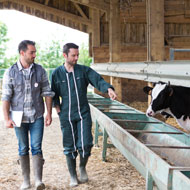Gove announces review of farm inspections

Under the current inspection regime, farmers can be visited by as many as five different bodies.
Defra secretary Michael Gove has announced a “thorough and comprehensive review” of farming inspections.
The move, announced at the NFU Conference on Tuesday (20 February), comes as the government prepares to publish an agriculture Command Paper that consults on future policy in the UK after Brexit.
Led by Dame Glenys Stacey, former chief executive of animal health, the review will seek ways to improve regulation. It will also consider how inspections can be removed or reduced to allow farmers to concentrate on animal welfare and environmental standards.
Under the current inspection regime, farmers can be visited by as many as five different bodies, all asking for similar information. Each visit adds to the burden on farmers and, at the same time, inspections over lapses, such as welfare standards, are often haphazard.
Speaking at the NFU Conference, Michael Gove said: “The rules associated with current subsidy payments are unwieldy and, very often, counter-productive. They require farmers to spend long days ensuring conformity with bureaucratic processes which secure scarcely any environmental benefits and which, in turn, require a vast and inflexible bureaucracy to police.
“As does the current farming inspection regime, which, despite several recent attempts at simplification, remains as unwieldy as ever. Every year, farmers are confronted by a barrage of inspections from different agencies, often duplicating costs in both time and money.”
He continued: “This review is not only long-required but also very timely as we guide our future approach and maximise the opportunities for leaving the EU. It will provide answers to some key general questions to guide our future approach, subject to the outcome of our negotiations with the EU.”



 The Animal and Plant Health Agency (APHA) has updated its online reporting service for dead wild birds.
The Animal and Plant Health Agency (APHA) has updated its online reporting service for dead wild birds.